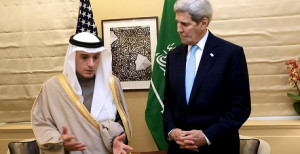The adoption of the Justice Against Sponsors of Terrorism Act (JASTA) by the US Congress and the impact it may have on Washington’s relations with Riyadh and the future of the Gulf region have been actively discussed across Arab media and social networks. This act grants the families of 9/11 victims the chance to sue Saudi Arabia for its involvement in the attacks.
The frustration that Riyadh and other Gulf countries have shown towards this development, in the opinion of the Egyptian newspaper Al-Ahmar, clearly shows that JASTA will increase tensions in US-Saudi relations even further. There’s been talks about the possible suspension of bilateral cooperation between the Kingdom of Saudi Arabia and the US in such areas including the fight against terrorism, the closure of US military bases in the region, and the withdrawal of billions of Saudi dollars from American banks. On the other hand, one may have the impression that Riyadh perceives JASTA through the prism of the current election season in the United States. Analysts point out that Riyadh has little to nothing to worry about, since it’s highly unlikely that American families will be able to win against Saudi Arabia in US courts to obtain compensation for the deaths of their loved ones in an attack that shook America. One would be demanded to provide irrefutable evidence that must prove the involvement of Saudi officials in the preparations of the attacks, which is a pretty tall order, the newspaper concludes.
A number of Arab lawyers have described the law as a direct violation of the concept of state sovereign immunity.
However, according to the Lebanese newspaper An-Nahar, the adoption of JASTA by the US Congress casts a severe blow against Saudi Arabia at a particularly difficult time for this monarchy. This will lead to the distancing between the US and Saudi Arabia against the background of the current turbulent situation in the Middle East, when the two states are still involved in various “proxy wars”. A number of Arab experts believe that Saudi Arabia must have been expecting a step like this one, since the foundations of bilateral relations between the two countries that were laid down by the founder of the modern Saudi state, King Abdul Aziz Al Saud and US President Roosevelt in 1945, have already been shaken. A prominent Lebanese journalist, Sarkis Nahum, is drawing the attention of his readers toward the fact that the differences that Washington and Riyadh had in their interpretation of the Arab Spring movement, followed by rapprochement with Iran over its nuclear program have created the preconditions for JASTA. But what’s even more important is that the two states in their assessments of the situation in the world are applying completely different and often conflicting doctrines.
According to Middle East experts, both countries have to go through a difficult test of their relationship. However, some authors offer their own versions. Thus, the Iraqi publicist, Maalla Hussein, believes that the Saudi ruling circles are waiting for two possible developments.
If it turns out that Saudi Arabia must pay compensation to the families of 9/11 victims, it will reject this idea and then would start withdrawing its huge financial reserves from American banks, but this step will require Riaydh to solve a long list of complex legal issues. In this scenario, Washington would mostly threaten the Al-Saud clan with a complete breakup of all political, economic and military ties.
The royal elites may follow the path of Qaddafi (who spent billions on compensation in 2003 for the downing of a Boeing airliner over Lockerbie in 1988) and pay the compensation in the amounts required by US courts, which will also weaken the country.
It’s still hard to say how JASTA is going to be implemented, says the UAE newspaper Al-Ittihad. This law may undermine relations that America’s allies and friends have been establishing with Washington for decades, since they will see that there’s no depth in such bilateral ties, therefore they may be broken up suddenly at any opportunity.
Yury Zinin, Leading Research Fellow at the Moscow State Institute of International Relations (MGIMO), exclusively for the online magazine “New Eastern Outlook.”

